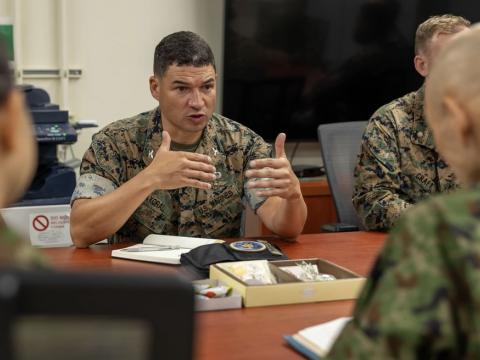From Computer Zero to Cyber Hero
At one point in his 10-year Navy career, Richard “Chit” Chitamitre, a former machinist mate, was concerned he might be kicked out. But an opportunity to cross train in the cyber field transformed his career.
Chitamitre, who is now a federal technology evangelist with Corelight Inc., joined the Navy in 2007, enlisting as a machinist mate in the nuclear program. Nuclear power machinist mates operate and maintain naval nuclear propulsion plants and associated equipment and supervise and administer nuclear propulsion plant operations, according to a Navy website.
As he was getting close to completing the comprehensive training, however, Chitamitre suffered a dislocated shoulder that failed to properly heal and ultimately required surgery. “I was getting close to becoming a full-fledged nuke. But by the time I recovered and got back, pretty much the Navy had put the nuclear program on hold,” he recalls.
He was reclassified into a career that would have had him “turning wrenches” in a ship’s engine room. “They essentially took my nuclear classification and just made me a regular machinist mate. That was disheartening because I had spent all of this time going through a program that was pretty difficult.”
But then the Navy decided it had too many machinist mates and offered him an opportunity to cross train into another field. “I enjoy computers, and I thought computers sound great, so let’s try joining the information technology community,” he thought. “I didn’t know much about computers aside from turning them on and maybe typing a Word document and pressing print.”
After talking to a career counselor, he applied for cross training into IT and was rejected. “When you get a rejection, they almost kick you right out of the military, so I was prepping to disembark on a new journey.”
Fortunately, his career advisor suggested he try for a cryptologic technician networks position within the intelligence community where people with technical expertise were badly needed. “I had no idea what they did. I really didn’t. But I just wasn’t ready to leave the military. I wanted to stay in and see where my career path would go,” he says.
He was accepted and went through the Joint Cyber Analyst course in Pensacola, Florida. “It is a six-month course where they take you from knowing nothing about computers to understanding basic computer science as well as doing operations, so kind of a zero-to-hero school for the military,” Chitamitre states.
While he was at the school, fear of being booted from the Navy drove him to graduate in the top 10 in his class. “I was terrified because if I had failed out of the school, I would have been out of the military. Fear drove me really well,” he says.
After graduating, he served with the National Security Agency’s Central Security Service in Hawaii. The organization conducts signals intelligence on foreign intelligence targets, cybersecurity operations to protect U.S. government communications, and cyberspace operations to gain a decisive advantage for the United States and its allies and partners.
He ultimately ended up in the office of Tailored Network Operations (TAO), now known as Computer Network Operations, an NSA cyber warfare and intelligence gathering organization. “TAO was the tip of the spear for exploitation. I worked pretty much for TAO for the duration of my three years from 2011 to 2014.”
During his time with TAO, he gained experience in network operations planning for exploitation and reporting to forward intelligence gathering, but he also was a founding member of a combat mission team. “I was the lead analyst. I maintained the training pipelines. It was such a rich experience,” he says.
In 2014, he was picked up by a cyber protection team. “Because I had a lot of exploitation experience, I needed to help defenders understand the mindset of attackers. I participated in red team exercises. I was a certifier. I pretty much ran the gamut on blue team/red team operations,” he adds.
His cyber protection team supported the creation of the Joint Task Force Headquarters-Department of Defense Information System. “That’s where I met some of the most fantastic people in my entire career. Very hard chargers. We were motivated by each other to essentially do better,” he asserts.
In 2017, his wife was expecting their first child, and Chitamitre recalls that none of the assignments he was offered would be a good fit for a family, so he transitioned to the private sector. He initially worked with a Fortune 100 financial firm before moving to Corelight.
Corelight is a natural fit, he indicates, because it grew up around the Zeek open source framework, and Chitamitre had gained experience with Zeek during his military career.
For other military personnel hoping to transition into a cyber career, Chitamitre recommends asking lots of questions. “If you have questions, ask them. Don’t be afraid to feel dumb because everybody has to start somewhere,” he says. “If you stick with it, and you ask questions, and you follow through, you’ll eventually gain that knowledge and experience to go from knowing nothing to knowing something to knowing more than you thought you could.”





Comments